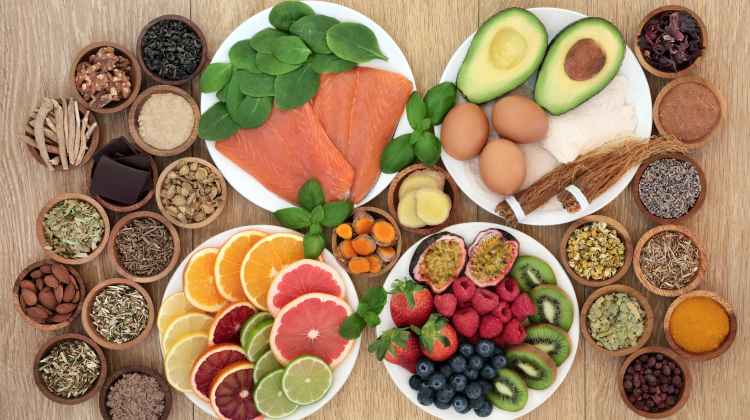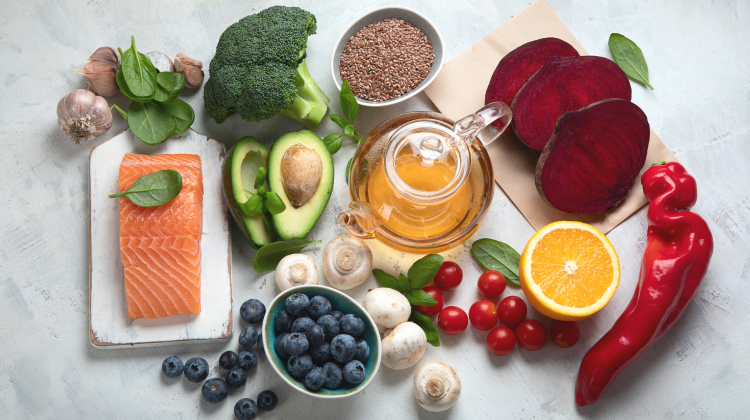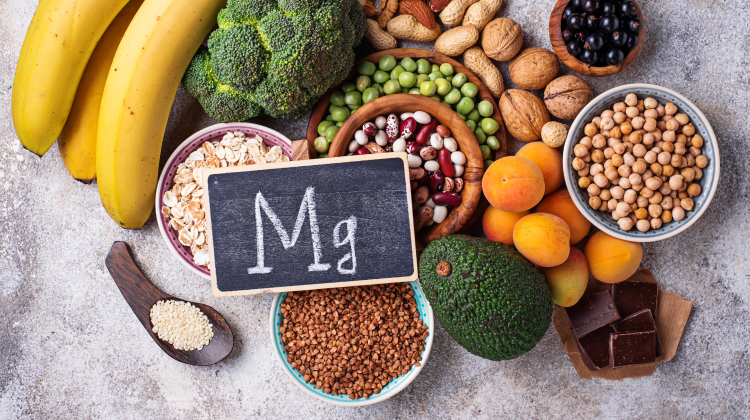7 Foods That Help Reduce Anxiety, Stress & What To Avoid 2024

Per the National Institute of Mental Health[1], anxiety disorders are the most common mental illness in the United States. An estimated 20 percent of adults (around 40 million) suffered from a generalized anxiety disorder last year. What’s even sadder is an estimated 30% of adolescents have an anxiety disorder.
Despite its prevalence, only about a third[2] of people seek help for treating anxiety. In addition to eating a healthy diet, other foods help with anxiety.
For example, there is a strong correlation between your blood sugars and your mood. This is because your brain runs mainly on glucose. Poor blood sugar control symptoms have been shown to echo poor mental well-being (anxiety, worry, and irritability).
7 Best Foods That Help With Anxiety
There is no food that can cure anxiety, but there are foods that can help reduce anxiety. Here are the top 7 foods for anxiety and stress.
- Anti-Inflammatory Foods
- Vitamin D
- Magnesium-Containing Foods
- Omega-3 Fatty Acids
- B Vitamins
- Zinc
- Ashwagandha
7 Best Foods That Help Ease Anxiety
Speak to your doctor or healthcare professional regarding different strategies that you can use to help manage depression and anxiety symptoms.
For example, some physicians use talk therapy, medications, breathing techniques, exercise, meditation, and other treatment courses.
No one food will cure your anxiety, but in a lot of cases, certain foods can reduce anxiety symptoms. Here are the top 7 foods to add to your diet to help with anxiety.
Anti-Inflammatory Foods

Inflammation and mood are intensely connected[3]. Cortisol, the “stress” hormone[4], begins as an anti-inflammatory in acute situations; but when chronically produced, actually augments inflammation. Thus, chronic inflammation can disrupt and alter the communication between your brain and neurotransmitter functions. This break in contact can cause
- Mood shifts
- Depression
- Anxiety
- Other mental health[5] problems
The good news is that eating foods that reduce inflammation can relieve anxiety symptoms.
A 2010 study[6] reviewed the antioxidant (antioxidants are our greatest food ally against inflammation) content of over 3000 herbs, spices, and foods. Herbs, spices, vegetables, and fruits are among the top antioxidant-containing foods for anxiety prevention.
In addition to fighting inflammation, antioxidants can help relieve anxiety by helping to balance your response to mood and stress.
Many people believe that fermented foods and probiotic foods help improve mood disorders. However, research[7] shows foods rich in these compounds have no anti-anxiety properties.
Vitamin D

Most of us spend our outside time slathered with SPF, wearing a sun hat, and fully covered with clothing to avoid ultraviolet light exposure. Even though you can get adequate vitamin D through sun exposure, our modern lifestyle and fear of UV light have made getting enough vitamin D very difficult.
You can also get vitamin D by eating foods such as
- Sardines
- Beef liver
- Milk
- Cod liver oil
- Salmon
However, even if you are attempting to, let’s say, drink enough milk to meet your daily needs of vitamin D (600 international units), you would need to drink five[8] gallons of milk daily. It’s no wonder an estimated[9] 77% of the United States lacks adequate amounts of vitamin D.
Vitamin D is essential for several functions, such as
- Handling calcium and ion channels
- Controlling serotonin and dopamine levels
- Secreting growth factors
- Shaping the microbiome (balance of unhealthy and healthy bacteria in the gut)
- Decreasing inflammation
Lower levels of vitamin D are associated with multiple[10] neurological disorders, including schizophrenia, depression, and anxiety.
For example, one study[11] published in 2015 found that vitamin D levels in patients with a wide range of anxiety disorders–also depressive disorders–were significantly less than those in the healthy adults’ control group.
When study[12] participants have a vitamin D deficiency and are supplemented with 50,000 international units weekly for three months, their anxiety significantly improves.
Another randomized controlled trial studied women[13] with type II diabetes showed that 50,000 IU of vitamin D daily decreased inflammation and improved mental health over four months.
As mentioned above, it can be challenging to obtain adequate vitamin D levels by diet alone. Talk to your doctor about starting a vitamin D supplement if you are having anxiety and believe you might be deficient.
Magnesium-Containing Foods

Magnesium is responsible for hundreds of roles and functions within your body, yet it is one of the leading deficiencies[14] among Americans today. Magnesium has several roles, mainly relaxing and calming your muscles and nervous system. It’s also vital for regulating hormones in your brain responsible for promoting relaxation in the body.
Unfortunately, researchers found[15] diets low in magnesium increased anxiety-related behaviors.
Foods high[16] in magnesium include
- Pumpkin seeds
- Chia seeds
- Almonds (raw)
- Spinach
- Cashews
- Black beans
- Dark chocolate
If you choose to supplement your diet with magnesium, be aware that too much will cause gastrointestinal distress and diarrhea. Therefore, be mindful of the dose, start small, then titrate up to an appropriate amount for your body.
Omega-3 Fatty Acids

The two main kinds of omega-3[17] fatty acids are eicosapentaenoic acid (EPA) and docosahexaenoic acid (DHA). These healthy fats may help regulate dopamine and serotonin. These hormones have soothing and comforting effects.
In addition, a diet rich in omega-3’s[18] has been linked to lower anxiety levels. It’s believed these fatty acids might also lower brain inflammation, which is a characteristic of people suffering from anxiety.
In 2018[19] researchers analyzed 12,268 adults and the correlation between omega-3 fatty acids and anxiety. Results showed that a higher dietary intake of polyunsaturated fatty acids EPA and DHA was inversely associated with anxiety disorder. These results suggest eating omega-three fatty acids might protect against anxiety disorders.
Another analysis[18] performed in 2018 gathered findings from 19 different studies. Experimenters compared subjects who took omega-3 supplements with a control group. Researchers concluded that individuals who took supplements of omega-3 fatty acids had the least anxiety.
The mechanism behind this is due to the membranes in our brain containing a considerable amount of omega-3s. Thus, a lack of omega-3s could cause various behavioral and mental disorders.
Foods high in omega-3 fatty acids include
- Flaxseed oil
- Fatty fish (salmon, mackerel)
- Cod Liver Oil
- Walnuts
- Chia seeds
B Vitamins

B vitamins are needed to make neurotransmitters in the brain. The job of neurotransmitters is to carry signals throughout your body by bridging the gaps between and connecting neurons to propagate signals.
These signals can affect every part of your body, from your temperament, mood[20], tiredness, and even hunger levels.
Therefore, B vitamins play an important role in brain function, mood, and anxiety levels. Specifically, vitamin B5 helps to create cortisol, the stress hormone.
Therefore, having a deficiency in any B vitamin can lead to a disruption in these neurotransmitters and result in an inability to deal with perceived stress and anxiety; faulty cortisol interaction impacts inflammation.
Consuming foods high in B vitamins affects attitude, energy, and concentration, positively. It also can promote brain health and functionality, especially as you age. Aging is strongly associated with inflammation.
Consuming adequate amounts of vitamin B has also been linked to protection against cognitive diseases such as Alzheimer’s and dementia.
Foods high in B vitamins include
- Poultry
- Meat
- Fish
- Dairy products
- Fortified breakfast cereal
- Nutritional yeast
Zinc

Research[21] shows that anxiety may also be related to an imbalance of zinc and copper. A controlled clinical study looked at people who had self-declared anxiety and a control group who did not suffer from anxiety.
When looking into the labs of individuals with chronic anxiety, they found a correlation between those with significantly higher levels of copper and deficient levels of serum zinc concentrations. More interesting is the participants had a considerable reduction in anxiety after zinc supplementation.
This could be because these two minerals (zinc and copper) compete with each other for absorption. Therefore, copper levels rise when you don’t get enough zinc.
Zinc is vital to producing neurotransmitters that directly affect your behavior and thinking. Low zinc levels are related to depression, anxiety, and psychiatric disorders like schizophrenia.
Foods high in zinc include
- Oysters
- Red meat
- Poultry
- Beans
- Nuts
- Dairy products
Ashwagandha

Ashwagandha is an herb that has been used as a natural remedy for stress and anxiety for centuries. Scientists completed a systematic review[22] on ashwagandha’s ability to treat anxiety effectively. The studies concluded that interventions with ashwagandha significantly lowered anxiety than placebo.
Furthermore, as an anti-oxidant ashwagandha protects the brain against aging and improves anxiety symptoms by fighting free radicals that damage the brain. Because of its anti-inflammatory abilities, research suggests that ashwagandha[23] helps anxiety, improves focus, and reduces fatigue without the adverse side effects of pharmaceuticals.
Foods To Avoid
Just as there are some foods that help to relieve anxiety there are also certain foods that can exacerbate mood disorders.
Processed Foods

Research[24] shows that consuming processed foods high in refined carbohydrates (white bread, white rice, pasta, etc.) and simple sugars (baked goods, pastries, sweetened beverages, etc.) can contribute to anxiety and depression.
Sugar and refined carbohydrates spike your blood sugar and can subsequently drop it later in the day. Such swings are stressful to the body, creating with it stress’s associated effects.
This yoyo effect of blood sugars and stress vacillations increases anxiety, nervousness, and fatigue. In addition, these foods can cause mood swings and alter your energy levels, making it more challenging to manage anxiety symptoms. They also cause inflammation which can limit neurotransmitter functionality.
To maintain regular blood sugar levels, choose high-protein foods at mealtimes. Protein does not contain sugar. Also, choose complex carbohydrates which are high in fiber. Fiber causes sugar to absorb more slowly into the bloodstream instead of dumping it all at once, causing a spike.
Limit Caffeine and Alcohol

Alcohol has the potential to boost anxiety symptoms like worry and attitude changes. A study[25] published by the British Journal of Psychiatry found that abstinence from alcohol is linked to a generally decreased risk of anxiety.
Research[26] also shows that ingesting too much caffeine can manifest anxiety. Specifically, people with social anxiety appear to be more susceptible to the impacts of caffeine.
Limiting caffeine consumption to one cup of coffee (or less) per day can help with anxiety. Green tea has slightly less caffeine and can be limited to two daily cups.
The Bottom Line
You might need to look at multiple aspects to manage anxiety effectively. First, talk to your mental health professional if you struggle with mental wellness. Along with other therapies, the foods you eat and those you avoid can help mitigate anxiety and support your overall health.
There is no cure for anxiety to be found in foods alone. However, simple diet modification, including removing processed foods and adding in some of the mentioned foods, is a great way to support overall well-being and health and should even benefit in managing anxiety.
+ 26 sources
Health Canal avoids using tertiary references. We have strict sourcing guidelines and rely on peer-reviewed studies, academic researches from medical associations and institutions. To ensure the accuracy of articles in Health Canal, you can read more about the editorial process here
- National Institute of Mental Health (NIMH). (2017). Any Anxiety Disorder. [online] Available at: https://www.nimh.nih.gov/health/statistics/any-anxiety-disorder
- Naidoo, U. (2016). Nutritional strategies to ease anxiety – Harvard Health. [online] Harvard Health. Available at: https://www.health.harvard.edu/blog/nutritional-strategies-to-ease-anxiety-201604139441
- Xu, Y., Wang, C., Klabnik, J. and O’ Donnell, J. (2014). Novel Therapeutic Targets in Depression and Anxiety: Antioxidants as a Candidate Treatment. Current Neuropharmacology, [online] 12(2), pp.108–119. doi:10.2174/1570159×11666131120231448.
- Hannibal, K.E. and Bishop, M.D. (2014). Chronic Stress, Cortisol Dysfunction, and Pain: A Psychoneuroendocrine Rationale for Stress Management in Pain Rehabilitation. Physical Therapy, [online] 94(12), pp.1816–1825. doi:10.2522/ptj.20130597.
- Renna, M.E., O’Toole, M.S., Spaeth, P.E., Lekander, M. and Mennin, D.S. (2018). The association between anxiety, traumatic stress, and obsessive-compulsive disorders and chronic inflammation: A systematic review and meta-analysis. Depression and Anxiety, [online] 35(11), pp.1081–1094. doi:10.1002/da.22790.
- Carlsen, M.H., Halvorsen, B.L., Holte, K., Bøhn, S.K., Dragland, S., Sampson, L., Willey, C., Senoo, H., Umezono, Y., Sanada, C., Barikmo, I., Berhe, N., Willett, W.C., Phillips, K.M., Jacobs, D.R. and Blomhoff, R. (2010). The total antioxidant content of more than 3100 foods, beverages, spices, herbs and supplements used worldwide. Nutrition Journal, [online] 9(1). doi:10.1186/1475-2891-9-3.
- Karbownik, M.S., Mokros, Ł., Dobielska, M., Kowalczyk, M. and Kowalczyk, E. (2022). Association Between Consumption of Fermented Food and Food-Derived Prebiotics With Cognitive Performance, Depressive, and Anxiety Symptoms in Psychiatrically Healthy Medical Students Under Psychological Stress: A Prospective Cohort Study. Frontiers in Nutrition, [online] 9. doi:10.3389/fnut.2022.850249.
- Usda.gov. (2022). FoodData Central. [online] Available at: https://fdc.nal.usda.gov/fdc-app.html#/food-details/173441/nutrients
- Norwitz, N.G. and Naidoo, U. (2021). Nutrition as Metabolic Treatment for Anxiety. Frontiers in Psychiatry, [online] 12. doi:10.3389/fpsyt.2021.598119.
- Maddock, J., Berry, D.J., Geoffroy, M.-C., Power, C. and Hyppönen, E. (2013). Vitamin D and common mental disorders in mid-life: Cross-sectional and prospective findings. Clinical Nutrition, [online] 32(5), pp.758–764. doi:10.1016/j.clnu.2013.01.006.
- Bičíková, M., Dušková, M., Vítků, J., Kalvachová, B., Řípová, D., Mohr, P. and Stárka, L. (2015). Vitamin D in anxiety and affective disorders. Physiological Research, [online] 64(Suppl 2), pp.S101-103. doi:10.33549/physiolres.933082.
- Eid, A., Khoja, S., AlGhamdi, S., Alsufiani, H., Alzeben, F., Alhejaili, N., Tayeb, H.O. and Tarazi, F.I. (2019). Vitamin D supplementation ameliorates severity of generalized anxiety disorder (GAD). Metabolic Brain Disease, [online] 34(6), pp.1781–1786. doi:10.1007/s11011-019-00486-1.
- Siavash Fazelian, Amani, R., Zamzam Paknahad, Soleiman Kheiri and Khajehali, L. (2019). Effect of Vitamin D supplement on mood status and inflammation in Vitamin D deficient Type 2 diabetic women with anxiety: A randomized clinical trial. International Journal of Preventive Medicine, [online] 10(1), p.17. doi:10.4103/2008-7802.252140.
- Nielsen, F.H. (2018). Magnesium deficiency and increased inflammation: current perspectives. Journal of Inflammation Research, [online] Volume 11, pp.25–34. doi:10.2147/jir.s136742.
- Xue, W., You, J., Su, Y. and Wang, Q. (2019). The Effect of Magnesium Deficiency on Neurological Disorders: A Narrative Review Article. Iranian journal of public health, [online] 48(3), pp.379–387. Available at: https://www.ncbi.nlm.nih.gov/pmc/articles/PMC6570791/
- Nih.gov. (2013). Office of Dietary Supplements – Magnesium. [online] Available at: https://ods.od.nih.gov/factsheets/Magnesium-HealthProfessional/
- Dyall, S.C. (2015). Long-chain omega-3 fatty acids and the brain: a review of the independent and shared effects of EPA, DPA and DHA. Frontiers in Aging Neuroscience, [online] 7. doi:10.3389/fnagi.2015.00052.
- Harvard Health. (2019). Omega-3s for anxiety? – Harvard Health. [online] Available at: https://www.health.harvard.edu/mind-and-mood/omega-3s-for-anxiety
- Natacci, L., M. Marchioni, D., C. Goulart, A., Nunes, M., B. Moreno, A., O. Cardoso, L., Giatti, L., B. Molina, M., S. Santos, I., R. Brunoni, A., A. Lotufo, P. and M. Bensenor, I. (2018). Omega 3 Consumption and Anxiety Disorders: A Cross-Sectional Analysis of the Brazilian Longitudinal Study of Adult Health (ELSA-Brasil). Nutrients, [online] 10(6), p.663. doi:10.3390/nu10060663.
- Gauthier, I. and Nuss, P. (2015). Anxiety disorders and GABA neurotransmission: a disturbance of modulation. Neuropsychiatric Disease and Treatment, [online] p.165. doi:10.2147/ndt.s58841.
- Russo, A.J. (2011). Decreased Zinc and Increased Copper in Individuals with Anxiety. Nutrition and Metabolic Insights, [online] 4, p.NMI.S6349. doi:10.4137/nmi.s6349.
- Pratte, M.A., Nanavati, K.B., Young, V. and Morley, C.P. (2014). An Alternative Treatment for Anxiety: A Systematic Review of Human Trial Results Reported for the Ayurvedic Herb Ashwagandha (Withania somnifera). The Journal of Alternative and Complementary Medicine, [online] 20(12), pp.901–908. doi:10.1089/acm.2014.0177.
- Cooley, K., Szczurko, O., Perri, D., Mills, E.J., Bernhardt, B., Zhou, Q. and Seely, D. (2009). Naturopathic Care for Anxiety: A Randomized Controlled Trial ISRCTN78958974. PLoS ONE, [online] 4(8), p.e6628. doi:10.1371/journal.pone.0006628.
- Aucoin, M. and Bhardwaj, S. (2016). Generalized Anxiety Disorder and Hypoglycemia Symptoms Improved with Diet Modification. Case Reports in Psychiatry, [online] 2016, pp.1–4. doi:10.1155/2016/7165425.
- Haynes, J.C., Farrell, M., Singleton, N., Meltzer, H., Araya, R., Lewis, G. and Wiles, N.J. (2005). Alcohol consumption as a risk factor for anxiety and depression. British Journal of Psychiatry, [online] 187(6), pp.544–551. doi:10.1192/bjp.187.6.544.
- Lara, D.R. (2010). Caffeine, Mental Health, and Psychiatric Disorders. Journal of Alzheimer’s Disease, [online] 20(s1), pp.S239–S248. doi:10.3233/jad-2010-1378.



